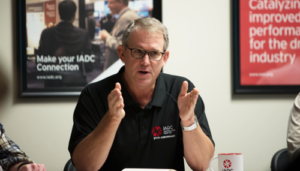IADC launches workgroup to develop advanced well control certification

IADC has kicked off the development of a scenario-based well control certification that will cultivate both technical and human factors skills through interactive exercises and simulations. “The industry came to IADC with a recognized need for well control training that would build upon an individual’s WellSharp training,” said Brooke Polk, IADC Director of Program Development and Technology. “This course will take well control training to the next level because it will provide an opportunity for experienced individuals to come in with core well control knowledge and use that knowledge in practical, hands-on training scenarios that will prepare them for real situations they will encounter in the field.”
IADC has pulled together a workgroup composed of subject matter experts from operators, contractors and training providers to discuss how to build the course and what its requirements should be. The group held its first meeting on 27 January, with participants from Chevron, Diamond Offshore, Maersk Training, Newhouse Consultants, Noble Drilling, Rowan Companies and Wild Well Control. Much of the discussion centered around the future of WellCAP Plus, IADC’s current scenario-based training course available to supervisory employees. The workgroup is now considering whether to revise WellCAP Plus to incorporate more human factors training, along with more simulation, or to create a completely new course.

The workgroup is further considering how much high-fidelity simulation should be required as part of the new course. Not every company or training provider has high-fidelity simulators or the means to acquire any considering the high costs involved. “There are only so many companies that have very high-fidelity equipment, which really limits the number of people who can go through these courses,” Mark Denkowski, IADC Executive Vice President of Operational Integrity, pointed out during the January meeting. “We have to keep in mind that what IADC does has a global reach. There are three or four high-fidelity facilities in Houston, but how many are there around the world? Access to them can be limited.” The workgroup also recognizes that scenario-based exercises, if facilitated appropriately, can offer realistic training even with limited simulation equipment.
Another consideration is how to measure and assess students’ human factors skills, and the workgroup is looking at existing simulation-based courses at Diamond Offshore and Maersk Training to use as potential models. Advanced well control courses conducted by both companies currently use debrief sessions to evaluate students on their human factors performance. For example, if communication skills were not sufficiently demonstrated in the exercise, that would be pointed out to the student during the debrief.
In Diamond Offshore’s course, students spend 80% of their time working on the simulator. “Human factors are soft skills, and they can be vague. This course enables us to show students how it impacts their jobs,” said Earl Williams, Manager of Learning and Development for Diamond and a member of the IADC workgroup. “If you put them in their work environment and expose them to human factors, it makes it a lot more real to them than discussing it in a classroom.”
Jason Pittman, Principal Instructor at Rowan Companies and another member of the IADC workgroup, is a strong advocate for using scenario-based exercises in a simulator setting to improve teamwork skills. “Having the human factors side really drives home that well control is about teamwork,” he said.
The second meeting of the IADC workgroup will be held 24 February at IADC’s Houston office. Individuals interested in joining the workgroup can contact IADC Competence and Workforce Development Specialist Patty Tydings.
Click here to read about Maersk Training and Rowan Companies’ enhanced well control pilot course.




